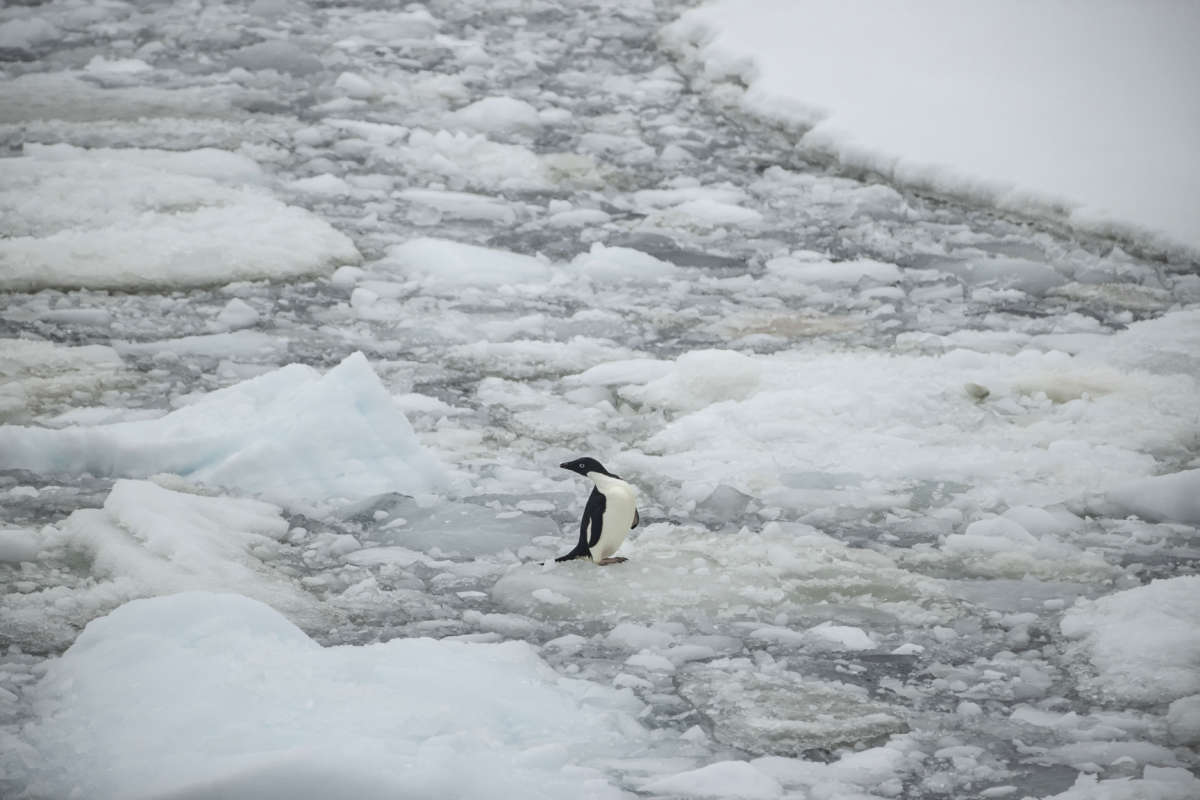Scientists with the United Nations weather agency on Friday expressed fresh concern over the climate crisis following recent extreme events in Antarctica — an area they say should not be taken “for granted.”
The remarks from climate experts with the World Meteorological Organization (WMO) — delivered just ahead of a key report from the Intergovernmental Panel on Climate Change — follow last month’s collapse of East Antarctica’s Conger Ice Shelf, record warm temperatures, and rare rainfall.
“Antarctica has often been referred to as a ‘sleeping giant,'” said Mike Sparrow, head of the WMO co-sponsored World Climate Research Program, in a statement noting it’s “the coldest, windiest, and driest continent and often thought of as being relatively stable.”
“However,” he continued, “recent temperature extremes and ice shelf collapses have reminded us that we shouldn’t take Antarctica for granted.”
“The Antarctic ice sheets hold almost 60 meters of potential sea-level rise. Understanding and properly monitoring the continent is therefore crucial for society’s future well-being,” said Sparrow.
The shelf’s disintegration in March 2022 has reshaped a landscape where coastal glacial ice was once thought to be stable. https://t.co/ijyxa8Vprk pic.twitter.com/bY9BS91HH6
— NASA Earth (@NASAEarth) March 30, 2022
Catherine Walker, an Earth and planetary scientist at the Woods Hole Oceanographic Institute and NASA, made a similar point about East Antarctica.
“All of the previous collapses have taken place in West Antarctica, not East Antarctica, which until recently has been thought of as relatively stable,” Walker said to NASA’s Earth Observatory.
“This is something like a dress rehearsal for what we could expect from other, more massive ice shelves if they continue to melt and destabilize,” she said. “Then we’ll really be past the turnaround point in terms of slowing sea-level rise.”
The unprecedented high temperatures that hit the region last month were the result of an atmospheric river that originated near southeast Australia and “spread warmth-trapping clouds and moisture well inland across East Antarctica,” as meteorologist Bob Henson wrote at Yale Climate Connections.
It was, in fact, “freakish warming at Earth’s South Pole,” as he put it.
Henson explained:
- At Vostok, a Russian weather station launched in 1958, the high of –17.7°C (0.1°F) on March 18 smashed the record for any March by 26.8°F and came in roughly 63°F above the average daily high. The 26.8°F represents the largest margin in world history for breaking a monthly record at any site with at least 40 years of data, according to Maximiliano Herrera, an expert on international weather records. It’s also the only time Vostok has gotten above zero Fahrenheit outside of December or January, never mind mid-March. Vostok’s all-time high is –14°C (6.8°F).
- About 350 miles away, on terrain and elevation roughly similar to Vostok, the French-Italian research site Concordia Station (staffed year-round, as is the case for Vostok) set its all-time record high of –11.5°C (11.3°F) on March 17. Data has been collected year round at this site only since 2005, a period too brief for an all-time record to carry too much weight. However, the reading was a mind-blowing 67°F above the daily average high of around –49°C (–56°F).
Etienne Vignon and Christoph Genthon, experts with the WMO Global Cryosphere Watch, put the temperatures at Concordia, located in an area known as Dome C, in the context of the March rainfall and pointed to wide reverberations of such changes.
“The warm temperature at Dome C, still much below freezing, is probably more a wake-up call, not having significant local impact in the inner ice sheet. On the other hand, the fact that the temperature was way above 0°C and that it rained at the coast upstream the previous day is more of a concern,” said Vignon and Genthon, both with France’s Laboratoire de Météorologie Dynamique, IPSL/Sorbone Université/École Polytechnique/CNRS.
They added that “rainfall is rare in Antarctica but when it occurs, it has consequences on ecosystems — particularly on penguin colonies — and on the ice sheet mass balance.”
While there are no penguin chicks at this time of the year, Vignon and Genthon cautioned that “the fact that this happens now in March is a reminder of what is at stake in the peripheral regions: wildlife, stability of the ice sheet.”
“Here the warm temperature at Dome C is a source of excitement for climatologists, that it rains at the coast in March is a source of concern for everyone,” they said.
The comments on the Antarctic developments came ahead of the expected Monday release of the IPCC’s Working Group 3 report on climate mitigation.
That report will land at “a crucial time,” according to Greenpeace, “as countries, businesses, and investors must recalibrate plans for a faster transition away from fossil fuels, towards climate justice, and truly sustainable, more resilient food systems.”
Angry, shocked, overwhelmed? Take action: Support independent media.
We’ve borne witness to a chaotic first few months in Trump’s presidency.
Over the last months, each executive order has delivered shock and bewilderment — a core part of a strategy to make the right-wing turn feel inevitable and overwhelming. But, as organizer Sandra Avalos implored us to remember in Truthout last November, “Together, we are more powerful than Trump.”
Indeed, the Trump administration is pushing through executive orders, but — as we’ve reported at Truthout — many are in legal limbo and face court challenges from unions and civil rights groups. Efforts to quash anti-racist teaching and DEI programs are stalled by education faculty, staff, and students refusing to comply. And communities across the country are coming together to raise the alarm on ICE raids, inform neighbors of their civil rights, and protect each other in moving shows of solidarity.
It will be a long fight ahead. And as nonprofit movement media, Truthout plans to be there documenting and uplifting resistance.
As we undertake this life-sustaining work, we appeal for your support. Please, if you find value in what we do, join our community of sustainers by making a monthly or one-time gift.
